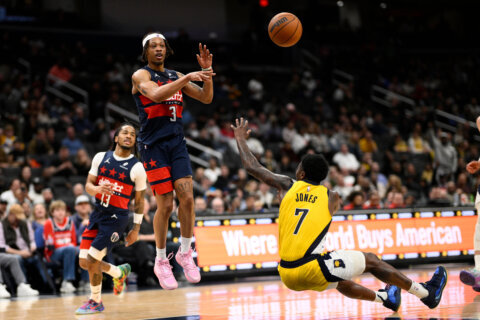WASHINGTON — Anyone who has watched the Washington Wizards play this year knows the team’s obvious talent has been undermined by its maddening inconsistency.
So, while Washington clearly still needs to find some answers on how to keep its effort level up night in and night out, there’s a much more pressing issue with this week’s news that All-Star floor leader John Wall will likely miss at least six weeks following an arthroscopic debridement surgery on his left knee.
With a week to go before the NBA trade deadline, where does that leave the Wizards?
The first answer to that question came Tuesday night at Capital One Arena, where Washington went toe-to-toe with one of the league’s hottest teams. Even without their star point guard, the Wizards pulled out a hard-fought 102-96 victory over Oklahoma City, ending the Thunder’s eight-game winning streak.
That was only the latest installment in this year’s Jekyll and Hyde season, in which the Wizards have beaten some of the best teams in the league and fallen to some of the worst.
They’ve won at Toronto and at Boston, thumping the Rockets in D.C. But their 11 losses to teams below .500 are the most of any team currently in playoff position. In fact, none of the other top eight teams in the East have more than eight such losses (Miami, 18-8).
And the schedule only gets tougher from here. Much tougher.
In fact, the Wizards have played the easiest slate of any team in the league to date. From here on out, it will be the exact opposite — they‘ll face the toughest remaining schedule. So, while the team has found a way to shine against upper echelon competition thus far, the Wiz will have to find the consistency that has escaped them to rack up enough wins to make the playoffs.
The good news is that if they can add reinforcements, when Wall comes back, he’ll have far less wear and tear on his body than he usually does come April, ready to inject fresh legs and talent into the lineup.
Perhaps the single biggest impediment to improving the roster is Washington’s salary cap situation, created in large part by the eyebrow-raising deal given to Ian Mahinmi two offseasons ago.
He’s in just the second season of a four-year deal that will pay him $64 million, spread fairly evenly over those years. It’s a big reason the Wizards are well over the cap and into the luxury tax. But shedding a contract like his in a trade would probably mean giving up a first-round pick, something TNT’s David Aldridge said isn’t going to happen, despite the team’s recent history of doing just that.
Meanwhile, Wizards know what Wall’s loss means to short term, but remain determined to keep their 2018 first-round pick after dealing their firsts in three of the previous four years to fill holes on roster. A trade this year would have to involve a star, not a role player.
— David Aldridge (@daldridgetnt) January 30, 2018
The Los Angeles Clippers have made it abundantly clear they are in full teardown mode after slinging Blake Griffin to Detroit. If that wasn’t a good sign that DeAndre Jordan is available, they got center Boban Marjonovic in return, crowding the frontcourt.
Jordan doesn’t solve all the Wizards’ problems, but he would give them a boost down low, where Washington ranks in the bottom half in the league in blocks and rebounds. Jordan is still a liability at the free throw line, though his 58.9 percent this season is a career best, just a smidge below Marcin Gortat’s 61.7 percent.
But what would Washington have to give up to get Jordan? If a first-round pick isn’t involved, Kelly Oubre would seem an inevitable part of the package, but that might be too steep a price to pay (and might negate much of the gains made by getting Jordan in the first place).
In order to offset the more than $22.5 million that Jordan is making this year, they’d probably have to include either Gortat or Markieff Morris as well, plus an additional bench player. For a team that has struggled to lengthen its existing rotation, when you take all they would have to give up together, would it be worth the trade?
The more prudent play may be a smaller, less splashy one. Aldridge tossed out the idea of a Wizards-Knicks deal that would land Willy Hernangomez — a useful, youthful big man — in exchange for Chris McCullough and a second-round pick.
The money matches up and it keeps Washington from parting with too much in terms of either personnel or assets. The Wizards could look for a similar deal for some guard reinforcement, possibly back to L.A. and Lou Williams, if he hasn’t played his way off the trade market with his recent hot streak.
But the bottom line is this: Wall, Bradley Beal and Otto Porter are in their primes and are being paid superstar money. There’s no rebuild option here. The Wizards don’t have to be desperate in the trade market, but they’re built to contend right now. Upgrading around the fringes might help them hold down a playoff spot until Wall returns, which could actually be a blessing in disguise.





